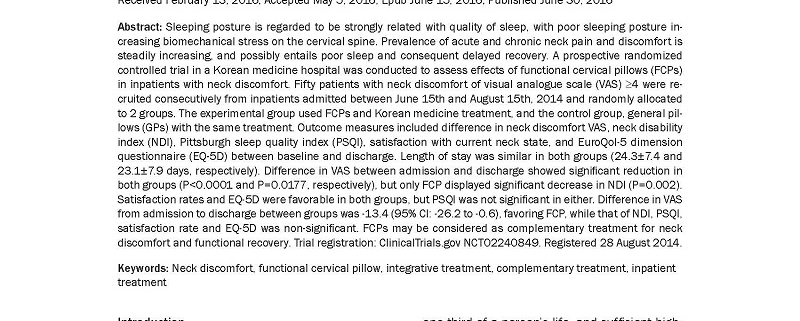Short-term effects of a functional cervical pillow on inpatients with neck discomfort: A randomized controlled trial

Sleeping posture is regarded to be strongly related with quality of sleep, with poor sleeping posture increasing biomechanical stress on the cervical spine. Prevalence of acute and chronic neck pain and discomfort is steadily increasing, and possibly entails poor sleep and consequent delayed recovery. A prospective randomized controlled trial in a Korean medicine hospital was conducted to assess effects of functional cervical pillows (FCPs) in inpatients with neck discomfort. Fifty patients with neck discomfort of visual analogue scale (VAS) ≥4 were recruited consecutively from inpatients admitted between June 15th and August 15th, 2014 and randomly allocated to 2 groups. The experimental group used FCPs and Korean medicine treatment, and the control group, general pillows (GPs) with the same treatment. Outcome measures included difference in neck discomfort VAS, neck disability index (NDI), Pittsburgh sleep quality index (PSQI), satisfaction with current neck state, and EuroQol-5 dimension questionnaire (EQ-5D) between baseline and discharge. Length of stay was similar in both groups (24.3±7.4 and 23.1±7.9 days, respectively). Difference in VAS between admission and discharge showed significant reduction in both groups (P<0.0001 and P=0.0177, respectively), but only FCP displayed significant decrease in NDI (P=0.002). Satisfaction rates and EQ-5D were favorable in both groups, but PSQI was not significant in either. Difference in VAS from admission to discharge between groups was -13.4 (95% CI: -26.2 to -0.6), favoring FCP, while that of NDI, PSQI, satisfaction rate and EQ-5D was non-significant. FCPs may be considered as complementary treatment for neck discomfort and functional recovery. Trial registration: ClinicalTrials.gov NCT02240849. Registered 28 August 2014.



